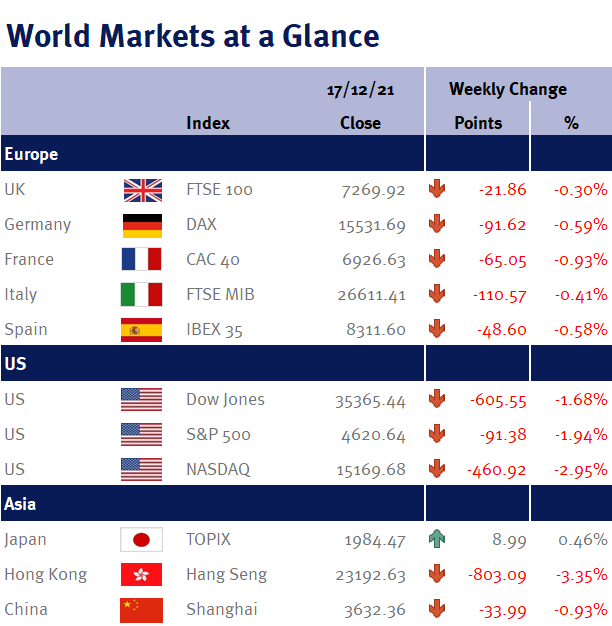Sentiment was also lifted as an agreement was finally reached to raise the US debt ceiling ahead of the December 15th deadline. Raising the debt ceiling to $31.4 trillion (from $28.9 trillion) averted a (self-imposed) possible debt default and will allow the government to operate without threat of default into 2023, at which point lawmakers will go through the whole aggravating process again.
Following the Fed’s decision, the UK’s MPC announced their decision to increase interest rates from 0.1% to 0.25% on Thursday. Given the threat of the Omicron variant, it was uncertain how the MPC would vote, however, the bank could not ignore the strong labour market and above forecast inflation data released earlier in the week. Equity markets barely moved on the announcement, while UK government debt did sell off and sterling strengthened, although both reverted shortly after. While the move is not particularly significant, it is a signal the bank is willing to act, however, it is important to note that any further tightening will likely be modest, gradual and data dependent.
Shortly after the Bank of England, the ECB made its announcement and relative to its US and UK counterparts, it did not surprise markets and made no changes to headline interest rates. They acknowledged emergency stimulus must be wound down but only made minor programme adjustments accordingly; therefore markets are not currently expecting any interest rate moves from the ECB in 2022.
Finally of note, was the monetary policy update from the Bank of Japan on Thursday night. In contrast to the Fed, BoE and ECB, the BoJ took a more cautious stance on winding back stimulus and lengthened its withdrawal from emergency pandemic measures. The BoJ cited a lack of inflation for its stance and despite focused efforts, Japanese policy has struggled to create inflation in recent times.
To summarise, while policy from central banks is showing signs of diverging this week, it is too early to conclude that paths are set and will continue at pace in different directions. This week’s moves were small initial adjustments and during 2022 there will be many more data points to consider. The coronavirus and associated lockdowns still impact many companies, goods and services and the implications of the new variant are still largely unknown. Consequently, monetary policy will need to remain accommodative and supportive when necessary and there remains an abundance of opportunity for economies and equity markets in 2022.
As the year draws to a close, economic data and news tends to quieten, consequently, our next scheduled update will be Tuesday 4 January 2022, although we will still be working and managing your investments over the Christmas period and of course will provide a market update should any major market moving events occur. Finally, we would like to wish you and your family a very Merry Christmas and a happy New Year.
Peter Quayle, Fund Manager


